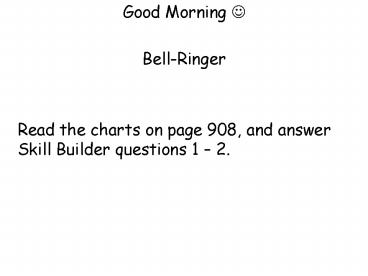Good Morning ? - PowerPoint PPT Presentation
1 / 24
Title:
Good Morning ?
Description:
Good Morning Bell-Ringer Read the charts on page 908, and answer Skill Builder questions 1 2. Chapter 31, Section 2 A Worldwide Depression Postwar ... – PowerPoint PPT presentation
Number of Views:140
Avg rating:3.0/5.0
Title: Good Morning ?
1
- Good Morning ?
- Bell-Ringer
- Read the charts on page 908, and answer Skill
Builder questions 1 2.
2
Chapter 31, Section 2 A Worldwide Depression
3
- Postwar Europe
- A. Unstable New Democracies
- 1. new Russian govt 1917
- a. Provisional Government
- b. constitutional democratic rule
- c. fell to Communist dictatorship
- 2. little experience w/ representative govt
- 3. too many political groups
- 4. coalition government
- a. temporary alliance of several parties
- 5. frequent changes in govt made it hard for
democratic countries to develop strong
leadership achieve long term goals
4
- The Weimar Republic
- A. Germanys New Democratic Government
- 1. several major political parties many minor
ones - 2. blamed for countrys defeat humiliation
in WWI - B. Inflation Causes Crisis in Germany
- 1. didnt increase taxes during war
- 2. Germans simply printed to pay for war
- 3. lost value after war
- 4. printed even more to pay reparations
- 5. German mark () fell sharply inflation
5
- C. Attempts at Economic Stability
- 1. Dawes Plan
- a. 2 million loan from American banks
- b. realistic schedule for reparation payments
- c. helped Germany bounce back
- D. Efforts at Lasting Peace
- 1. G. Stresemann (Germany) A. Briand
(France) - a. signed treaty promising 2 countries would
- never again make war against each other
- b. Germany was admitted to League of
- Nations
- 2. Kellogg-Briand peace pact
- a. Frank Kellogg (U.S.) arranged agreement
- w/ France
- b. almost every country signed
- c. to renounce war as an instrument of
- national policy
- d. no means to enforce provisions
6
- Financial Collapse
- A. A Flawed U.S. Economy
- 1. uneven distribution of wealth
- a. rising productivity profits
- b. profits not evenly distributed
- 2. many Americans buying less
- a. couldnt afford goods
- 3. overproduction of business agriculture
- a. factories produced, but Americans didnt
buy - b. unable to sell, store owners cut back
orders - c. factories reduced production laid off
- workers
- d. new farming methods machinery
- more crops more food
- e. faced competition from other countries
- decrease in prices profits
- f. many farmers couldnt pay bank loans
- weakened banks, some closed
7
- B. The Stock Market Crashes
- 1. middle class bought stocks on margin
- a. paid small of stocks price as down
pymt. borrowed rest from stockbroker - 2. Sept. 1929 stock prices increased
- 3. Oct. 1929 stock prices decreased
- 4. led to panic everyone wanted to sell
stocks no - one wanted to buy
- 5. 16 million stocks sold, then market
collapsed
8
- The Great Depression
- A. A Long Business Slump
- 1. factory production cut in half, businesses
failed, - banks closed
- 2. 9 million people lost savings accounts
- 3. many farmers lost land
- 4. by 1933 ¼ American workers had no job
- B. A Global Depression
- 1. bankers demanded repayment of overseas
loans - 2. American investors withdrew from Europe
- 3. U.S. Congress placed high tariffs on
imports, so - American would stay in U.S. pay for
goods - 4. many countries depended on exporting to
U.S. - 5. other countries raised tariffs world trade
- dropped by 65
9
- C. Effects Throughout the World
- 1. Germany Austria
- a. b/c of war debts dependence on U.S.
- loans
- b. 1931 Austrias largest bank failed
- 2. Asia
- a. farmers urban workers suffered as
- value of exports fell
- 3. Latin America
- a. U.S. European demand for products
- dropped, prices collapsed
10
Hoovervilles in Seattle, Washington
www.images.encarta.msn.com/.../pho/t029/T029195A.j
pg
11
www.content.answers.com/.../a6/180px-Hoovervile.jp
g
12
"Nipomo, Calif. Mar. 1936. Migrant agricultural
worker's family. Seven hungry children.
Mother aged 32, the father is a native
Californian. Destitute in a pea pickers camp,
because of the failure of the early pea crop.
These people had just sold their tent in order
to buy food. Most of the 2,500 people in this
camp were destitute."
www.loc.gov/rr/print/list/128_migm.html
13
www.loc.gov/rr/print/list/128_migm.html
14
www.loc.gov/rr/print/list/128_migm.html
15
(No Transcript)
16
Bread Line
www.earthhopenetwork.net/depression_bread_line_Co
17
Soup Line
www.thepatrioticgentleman.com/TheGreatDepression
18
www.recessionhistory.info/wp-content/uploads/2008
19
Men on the move in search of jobs, some abandon
families altogether
20
The Dust Bowl
21
FDR giving one of his Fire-Side Chats
22
- The World Confronts the Crisis
- A. Britain Takes Steps to Improve Its Economy
- 1. voters elected National Government
- a. passed high protective tariffs
- b. increased taxes
- c. regulated currency
- d. lowered interest rates
- 2. slow, but steady recovery
- B. France Responds to Economic Crisis
- 1. Popular Front
- a. didnt work, but preserved democracy
- C. Socialist Governments Find Solutions
- 1. Denmark, Sweden, Norway
- a. Sweden public works
- b. increased welfare benefits
- c. taxed all citizens in order to pay for
- benefits
23
- D. Recovery in the United States
- 1. Franklin D. Roosevelt (FDR)
- a. New Deal
- 1. large public works projects
- 2. welfare relief programs
- 3. stock market banking regulations
- b. Believed govt spending would create jobs
- start a recovery
- 2. New Deal eventually reformed U.S. economic
- system
Franklin D. Roosevelt
24
- Daily Essential Questions
- How did WWI change the balance of economic power
in the world? - 2. How did margin buying contribute to the stock
market crash? - 3. What problems did the collapse of the
American economy cause in other countries?































